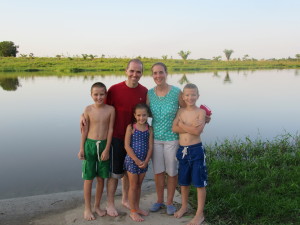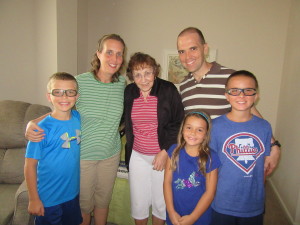12 Ways of Christmas
 From our hearts this Christmas, we offer these 12 praises for the ways we have witnessed God’s goodness in the flesh… Read More
From our hearts this Christmas, we offer these 12 praises for the ways we have witnessed God’s goodness in the flesh… Read More
 From our hearts this Christmas, we offer these 12 praises for the ways we have witnessed God’s goodness in the flesh… Read More
From our hearts this Christmas, we offer these 12 praises for the ways we have witnessed God’s goodness in the flesh… Read More
As we prepare for Thanksgiving with a renewed vision to daily offer our lives as a sacrifice of thanksgiving, some practical words from Paul provide guidance. He writes to the Roman believers about the path of honor in God’s kingdom. In Romans 12:9, he exhorts them to return to return to the limits of what is good and cling to it. They must turn from evil to cling to the good. This exhortation portrays the positive vision for repentance. To repent means pursuing that which is good, and holding fast to it…at all costs. Repentance requires a turning away from evil, all that is not good. We must return to a life limited to what is good. In reality, such a “limited” life lasts forever. Read More
Psalm 50 reflects the themes of our narrative thus far, including creation, judgment, and the hope of restoring innocence, honor, and power to the relationship between God and His people. In the first half of the Psalm, God appears in His creation to judge His people. The type of people in focus in the first half are those who keep their religious duties, but they lack a true “sacrifice of thanksgiving.” Such a sacrifice testifies to complete dependence and trust on God, as opposed to the performance and achievement possible through various religious duties. God’s people depend on Him, but He is not dependent upon their sacrifices. In the first part of Psalm 50, God responds to the group of those who “do” sacrifice, inviting them to “be” a sacrifice. “Offer to God a sacrifice of thanksgiving…Call upon Me in the day of trouble; I shall rescue you, and you will honor Me” (50:14-15). Read More
How then can we better discern the way our culture is wired? Jayson Georges, in his book, “The 3-D Gospel,” illumines what undergirds our culture. He joins other scholars in identifying it as a guilt-based culture. Our understanding of right and wrong, our focus on moral behavior, and our understanding of salvation through legal metaphors, all stem from a worldview emphasis based in the tension between guilt and innocence. It is highly individualistic, and so the application of salvation tends to focus on forgiveness of personal sins and a personal relationship with Jesus. Community living presents a significant challenge, which may explain why church budgets reflect many programmatic attempts to promote such community. Many world cultures default to a relational reality rather than an individual one. Read More
Let’s examine fishbowl faithfulness from the perspective of “choices.” In a very insightful presentation on “The Paradox of Choice” (TED Talk, 2005), Barry Schwarz describes a simple scale for understanding how many options are available in any given culture. In his research, having “some” options are better than having “none,” but “more” options are never better than “some.” He argues that our land has long ago leapt out of “none,” surpassing the moderation of “some,” before landing in the excess of “more.” Schwarz finds that the more choices we have, the more we experience “paralysis.”
May this series of blog posts serve as a tool of reflection, preparing us to offer a sacrifice of thanksgiving around our annual feast on November 24. May it also alert us to the call of God to offer our very lives to Him as a daily sacrifice of thanksgiving. As such, please consider this series as an occasion for preparation and response, almost like an “Advent” liturgy for Thanksgiving. For this purpose, reflective questions for the family are included following each part. “Family” should be understood as those with whom we share life, so whether single, married, a child, or an adult, we all share life with somebody to some extent. Everything that appears in these posts comes from our own heart as a family sharing life with others, where we have struggled and surrendered and sacrificed in order to continue thriving in the reality of fishbowl faithfulness. For the purposes of this series, a “fishbowl” refers to a focused life of hearing and obeying the Father in His mission. It involves being known and truly knowing others through authentic community. Such a lifestyle finds contentment within limits of time, space, and relationships, avoiding distractions and discontented yearning for “greener pastures,” though the hope for resurrection keeps increasing. We enter and remain in the fishbowl through repentance and sacrifice, because of the joy set before us… Read More
Construction is underway on the next house at The Orchard Children’s Home! (Thank you to our friend, Stephen Lewis, for this video. Perhaps some of you who live on the west coast might want to meet Steve, because he is now the KAI West Coast Rep).
The Orchard – new home construction. from Perfect 10 Productions on Vimeo.
 The beginning of September marked two years since we moved to Peru. Two years ago, right before our move, we spent a very special week with Mark’s Uncle Larry and Aunt Mary Kay in Florida. Our beloved Uncle Larry recently passed on. Aunt Mary Kay (pictured with us) remains and continues to encourage us, as do countless family members and dear friends. Things change even as short periods of time pass by, yet our hope abounds, because our Lord is faithful. We moved to Peru because of this hope. We trust that this family interview will serve as a testimony and an encouragement to you… Read More
The beginning of September marked two years since we moved to Peru. Two years ago, right before our move, we spent a very special week with Mark’s Uncle Larry and Aunt Mary Kay in Florida. Our beloved Uncle Larry recently passed on. Aunt Mary Kay (pictured with us) remains and continues to encourage us, as do countless family members and dear friends. Things change even as short periods of time pass by, yet our hope abounds, because our Lord is faithful. We moved to Peru because of this hope. We trust that this family interview will serve as a testimony and an encouragement to you… Read More
“Judgment.” Read More
How do we know God loves us?
 Answer this question to yourself: “How do we know God loves us?” Now give another answer.
Answer this question to yourself: “How do we know God loves us?” Now give another answer.
After studying the Father’s love for the Son in John’s gospel, along with our daily observations on life and mission, may we suggest some additional answers to this question. First, we know God’s love for us because He shows us what He is doing:
“For the Father loves the Son, and shows Him all things that He himself is doing…” (John 5:20; NASB) Read More